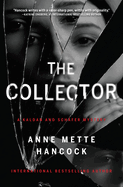
The list of reliably good Danish crime novelists--Jussi Adler-Olsen, Katrine Engberg and Peter Høeg among them--just got longer. To that roster should be added Anne Mette Hancock, who follows The Corpse Flower with The Collector, a second steely and rewarding thriller featuring Erik Schäfer, a detective with the Copenhagen police, and investigative journalist Heloise Kaldan. This time they contend with the disappearance of a local child.
As the novel begins, the unmarried Kaldan is at a clinic confirming her unplanned and unwanted pregnancy. She's discussing next steps with her doctor when he receives a phone call: his 10-year-old son, Lukas, hasn't shown up at his after-school destination. The novel's roving perspective swings to Schäfer, who heads to Lukas's school--now a media circus--from which the boy seems to have disappeared. Schäfer is apprehensive when he spots Kaldan: "Could he trust Heloise in a life-or-death situation? Absolutely. When it came to work? That was another matter."
How Kaldan's personal damage fuels her aversion to parenthood twines with the novel's theme of children's vulnerability. Hancock gives readers even more to consider, including the tension between the police and the press, the PTSD unique to veterans and counterpoints to Denmark's famous liberalism. The Collector's themes are filtered through Kaldan and Schäfer, their relationship symbiotic but refreshingly platonic. As Kaldan, thinking about the older, married Schäfer, admits to herself, she "always felt a bit tipsy in his company, safe and comfortable. You didn't need to be Freud to figure out how things stood." --Nell Beram, author and freelance writer

